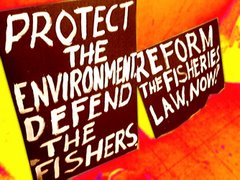Sunday, December 23, 2007
AN OPEN LETTER TO OUR LEADERS
AN OPEN LETTER TO OUR LEADERS
Greetings.
In behalf of thousands of Fisherfolks dislocated by the ongoing off-shore mining operated by the Japan Petroleum Exploration Inc. in the Tañon strait protected seascape, we would like to urge your office to immediately stop the operation of this destructive corporation.
Thousands of already impoverished fisherfolks in Pinamungajan and Aloguinsan were disallowed from fishing. JAPEX virtually put up their empire when they declared a 24 hour fishing ban in the area and to fortify their presence in the community they have requested the presence of police and the military to intimidate and quash constitutionally guaranteed rights of Filipino people to protest projects that are detrimental to their interests and well being.
Your position against the off-shore mining operation of JAPEX is not only important to small fisherfolks in the region but to the whole economy and to the global effort of preserving critical habitat and biodiversity as well.
To quote the scientific consensus of the Philippine Association of Marine Science from their their resolution against the oil exploration, they said that the impacts of activities such as seismic surveys, exploratory drilling, and actual oil mining operation would negatively impact the marine ecosystem and organisms dependent on it; sound is very important to whales and dolphins as they use it for hunting, navigation and communication, and in general, these animals maybe sensitive to certain sound levels;”
In relation a detailed study being conducted by Aragones et al. in the area showed immediate negative effects on the surface behaviors and delayed (1 year after) negative response on the relative abundance of spinner dolphins implicating short and intermediate term changes on these animals possibly brought about by the seismic surveys (using gun arrays) conducted in the summer of 2005.
Furthermore, current oil drilling activity of JAPEX will contribute to global warming and will not solve the issue of oil security in a deregulated industry. This dirty initiative is directly in violation of various international environmental protocols to which our country is a signatory.
We cannot equate the value of Tañon strait to a mere 8 to 10 years supply of fossil fuel. We cannot trade food security, healthy environment, and dynamic biodiversity to destroying the Tañon protected seascape.
Former President Ramos was correct in declaring the area under PD 1234 a protected seascape, but current government agencies and other governmental offices were wrong when they collude with JAPEX by short circuiting the legal processes.
Our legal luminaries under the Integrated Bar of the Philippines were correct when they said the project violates the basic law of our land. The position of the Business Community under the Cebu Chamber of Commerce and Industry demonstrate that environmental protection and development is relevant and is not against each other.
We urged your office again as mandated by the Filipino people and as stewards of our environment to pursue sustainable development and do away with environmentally destructive projects such as JAPEX.
Mabuhay.
Sincerely,
Vince Cinches
Executive Director
Sunday, December 2, 2007
Letter from Cebu Chamber of Commerce Inc. for DOE Secretary Reyes
http://globalnation.inquirer.net/cebudailynews/opinion/view_article.php?article_id=104023
Tañon Strait: Prevent damage to biodiversity
(Letter to Energy Sercretary Angelo Reyes, Nov. 28, 2007).
Greetings from the Cebu Business Community.
We are writing this letter of concern on the impact of the oil exploration on the biodiversity of Tañon Strait.
It is scientifically proven that the Strait is one of the country’s biodiversity hotspots in terms of cetacean density and diversity, as well as coral reefs. The area is also a distinct habitat of the Chambered Nautilus, and a migration route of Whale Sharks, hence the proclamation of the area as a protected seascape under Proclamation 1234 signed by then President Fidel Ramos on May 1998.
While we at the Chamber believe that economics and biodiversity resource systems can be integrated in a comprehensive and sustainable manner, we feel that all stakeholders in this exploratory activity should address the need to balance the uitilization-driven policy involving modification of biodiversity for human needs, with the conservation-driven policy for maintaining natural biodiversity.
Biodiversity is important on global, ecologoical and human scales. Biological processes regulate global climate and cycling of essential elements and substances and as a result perpetuate a global system favorable to the support of life. Greater species diversity contributes stability to ecosystems, and conversely, a healthy functioning ecosystem supports greater diversity of life. From the human perspective, our societies need living resources, and greater biodiversity offers better variety of foods, building materials, and medicine amongst others.
Our country is one of the contracting parties in the Convention on Biological Diversity in Rio de Janeiro signed on June 1992, objectives which include the country’s responsibility to conserve and sustainably use biodiversity. Further, the Philippines is a member of the International Union the Conservation of Nature (IUCN) since 1992. the UCN, a union of sovereign states, government agencies and NGOs, initiates and promotes scientifically based actions that will ensure perpetuation of the natural environment.
Given these international commitments, we would like to call on your good office to deal with the oil exploration activity in a precautionary manner that will prevent, or at least reduce, damage before we reach the stage of irreversible biodiversity loss. - Francis O. Monera, president, Cebu City Chamber of Commerce and Industry








